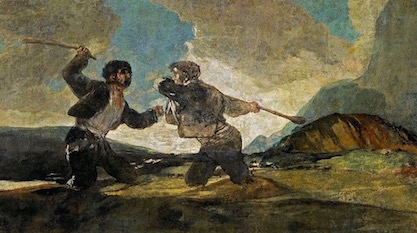 Faith & Science
Faith & Science
 Human Origins and Anthropology
Human Origins and Anthropology
Trouble in Paradise? At BioLogos, Theistic Evolutionists Fall Out Among Themselves

BioLogos is the theistic evolutionist advocacy group founded by Francis Collins. For years they have been gravely advising their fellow Christians that science rules out belief in a historical first pair of human beings. That evolutionary view, posing a seemingly heavy theological challenge to traditional Christian faith, has taken a couple of hits in recent days.
Earlier this year, a young star at BioLogos, biologist Dennis Venema, came out with a book on the Adam-and-Eve question, co-authored with theologian Scot McKnight. As Ann Gauger notes here, Venema was handed his hat by a far more distinguished scientist, Oxford University-trained geneticist Richard Buggs at the University of London. Buggs read Venema’s treatment of the subject in Adam and the Genome: Reading Scripture after Genetic Science, and wrote him an email taking him to task for failing to understand some of the vital relevant science. Venema, who teaches at Trinity Western University, near Vancouver, did not reply, perhaps because of other pressing business. Buggs then published his comments, which, while gently phrased, are devastating.
Meanwhile, BioLogos was in the middle of a parting of the ways with another young star in the theistic evolutionary firmament. Joshua Swamidass is a computational biologist at Washington University. He was on the BioLogos speakers list, then disappeared from it. He was a constant presence on the BioLogos message boards, then disappeared from there too. What happened? That’s not clear, but these kinds of public spats never emerge out of nowhere. There is always a background, which in this case remains veiled. In any event, it had something to do with Dennis Venema and Adam and Eve.
In June, Swamidass reviewed Adam and the Genome in a symposium at the website Sapientia. While recounting some of his own journey up from a youthful “trust” in intelligent design, “creation science,” and “anti-evolutionism” (these are all different things, but let it pass), Swamidass focuses on Venema’s contention that a fairly recent first pair of ancestors, a “genealogical Adam,” is ruled out by genetics.
Venema omits important scientific information that materially affects the theological response. Compounding these omissions, the introduction articulates the “assumption” that Venema’s science is correct (p. xii). Consequently, it appears that McKnight believes genetics rules out Paul’s genealogical Adam, even though this is not the case. This scientific error seems to unduly shape his interpretive goals.
Moreover, it is hard to endorse an after-science approach to Scripture; reading before4 or with5 science would be more grounded. The authors do talk of “dialogue” between science and theology, but the conversation in this book is one-sided. Missing key caveats, Adam and the Genome implies that evolution itself requires a dramatic “rethink” of Adam. Biblical exegesis appears subservient to an accurate but poorly delimited scientific account. [Emphasis added.]
Those are, needless to say, fighting words when directed at a close colleague. Venema responded a couple of weeks later.
Venema begins by saying he’s “grateful” for the discussion about his book. He embraces Swamidass as a “colleague.” A note of concern, though, enters in his assertion that what Swamidass “offers is, as far as I am aware, unique in the Christian conversation on origins.”
Venema adopts a patronizing tone as he acknowledges, “I can certainly understand that these ideas may have appeal for some seeking to reconcile science and particular interpretations of the Genesis narratives.” Then the daggers come out. He attributes to Swamidass the “horrific” idea that “there are a few hundred thousand years of human history where everyone else is not made in God’s image.”
Do we really want a theology that names them all as subhuman animals until their lineage happens to encounter and interbreed with Adam’s (Eurasian) offspring? God forbid. Likely this was not Swamidass’s intent, of course, but it seems to me that models like these lead to this decidedly unsavory conclusion.
Fast forward to last month. BioLogos president Deborah Haarsma chides prominent pastor and writer Tim Keller, an ally, for a video in which she says Keller defined as orthodox Christian belief the idea of a historical first pair, the “first humans and sole progenitors,” created “de novo,” meaning from no ancestral stock, even though “his scientist friends have explained to him the scientific consensus that the human race did not originate from only two individuals.”
At this, writing over this past weekend, Swamidass replied. Haarsma “misrepresents Keller’s statements in this video.” The article “is not accurate. Tim Keller does not make this claim” about “first humans and sole progenitors.” Swamidass alludes to the “overstatements of evolutionary science.” On Adam and Eve:
Perhaps Keller is wrong, but those arguing against him must do so without claiming the authority of science. There is absolutely zero evidence against Keller’s confession of the de novo creation of Adam and Eve “from the dust.”
Here’s where it gets really awkward. Swamidass says not only is the possibility of a historical first couple of this kind not ruled out, but this fact is known to BioLogos: “This unequivocal scientific fact is an open secret among many BioLogos biologists, including many of those on the Board.” This is a remarkable statement. They know the truth, he says, but deliberately broadcast a different message.
Swamidass adds that, “Privately, more than one scientist has asked [Haarsma] to correct the scientific error in this article. Hopefully she will.”
Swamidass faults Venema for “misrepresent[ing] my views.” He speaks of his past decision to “join the BioLogos speakers bureau,” but does not explain what prompted his departure.
What a mess. This is an omelet that is going to be very difficult to put back into the eggs.
It’s painful when friendships fall apart in front of your eyes. Here, though, I won’t tell you I feel terrible about it. It’s not that I have a stake in the fight per se. I’m not a Christian, nor, obviously, a theistic evolutionist. Discovery Institute takes no position on how, or whether, you should read the book of Genesis. Our interest lies in getting at the truth about nature. But theistic evolution has been an orthodoxy that tells laypeople what to think, based on shallow science. When operations like that crack up, it clears the air so that thoughtful people can consider ultimate questions for themselves.
We may have more to say on Venema’s book another time. Certainly, though, its contention as to human origins — a key plank in the BioLogos mission, now attacked from within and without — lacks the authority to compel assent.
No, I’m not saying that BioLogos is on the verge of a crackup. But the unveiling of hidden tensions like this, in the normally disciplined TE ranks, is likely a healthy development.
Image: Fight with cudgels, by Francisco de Goya [Public domain], via Wikimedia Commons.


